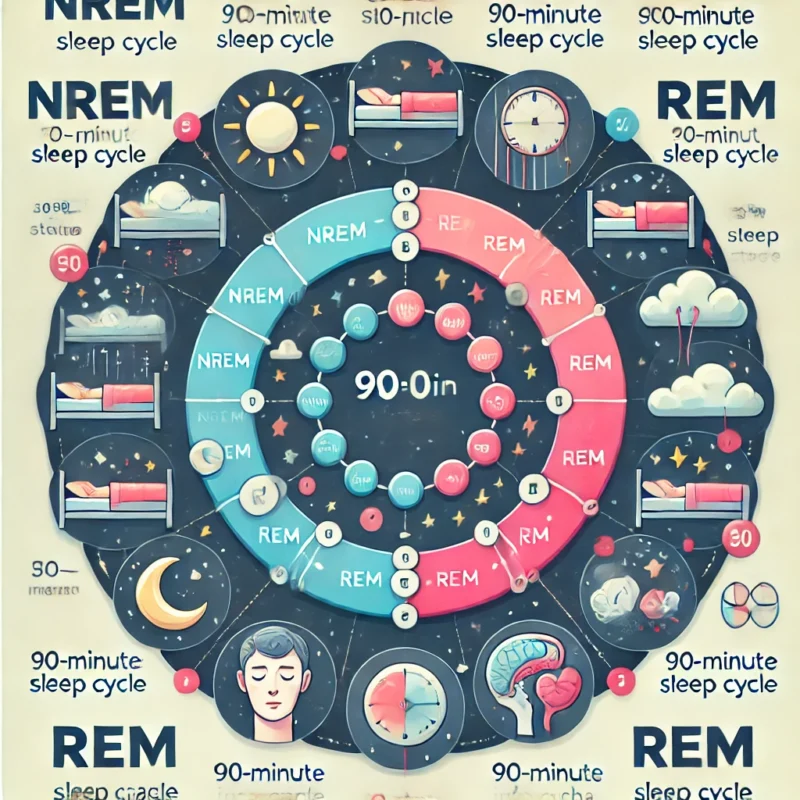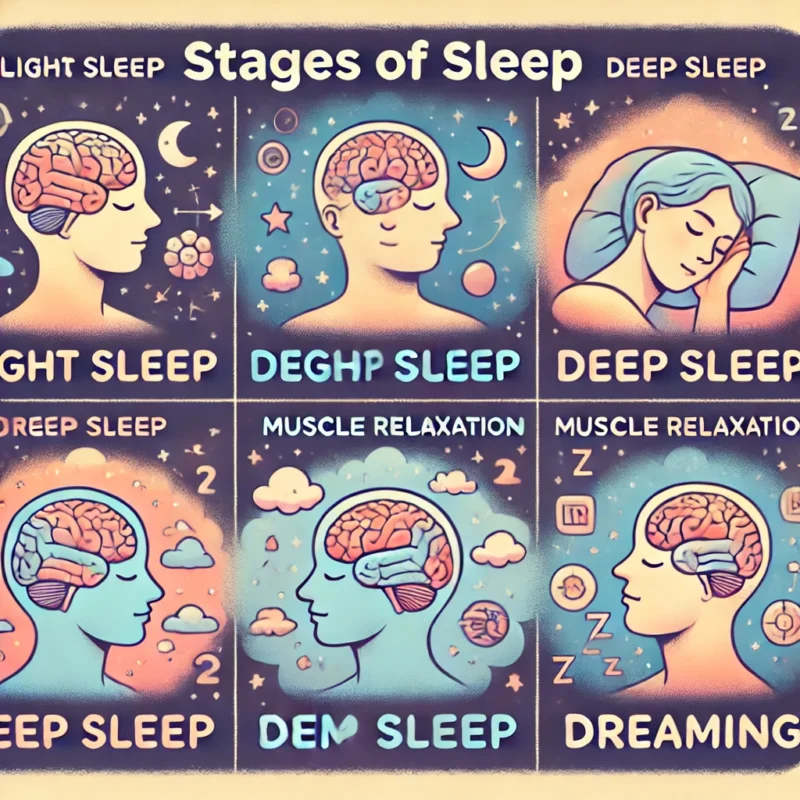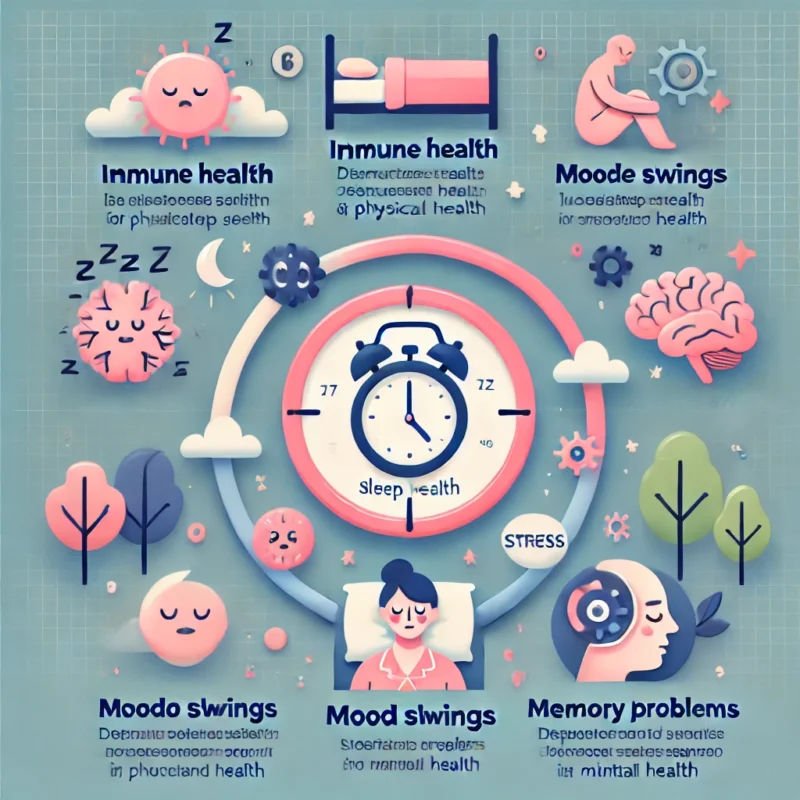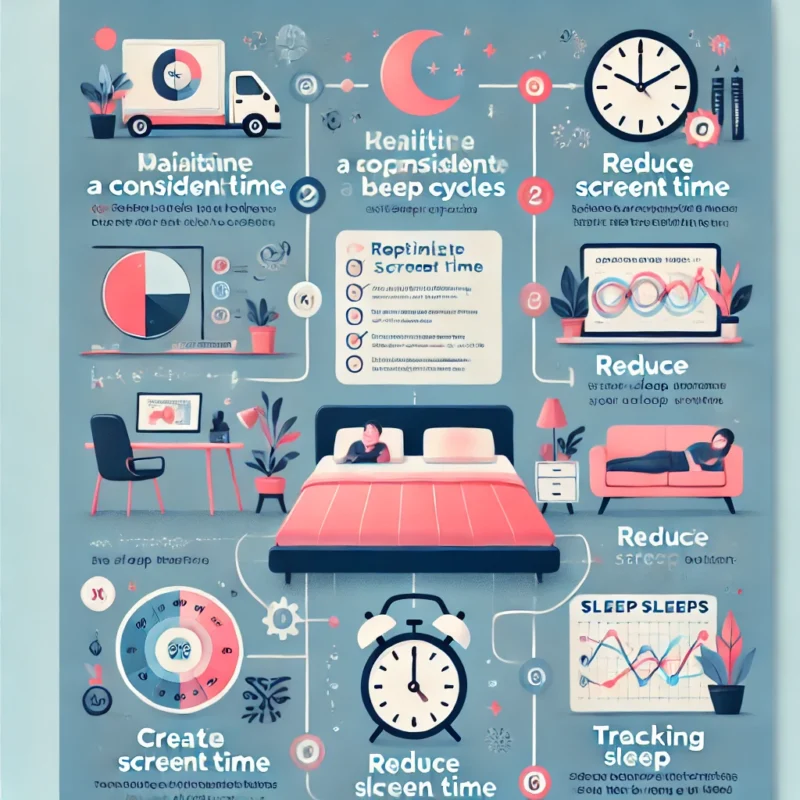In today’s fast-paced world, sleep is often the first thing we compromise. With the pressures of work, family, and personal goals, many of us feel that there simply aren’t enough hours in the day to get everything done. Sleep is frequently sacrificed, relegated to an afterthought as we push through life’s demands. However, sleep is more than just a time of rest; it is a crucial, active process that plays a central role in our physical, mental, and emotional health.
The human body is designed to undergo a series of sleep cycles each night. Each cycle lasts about 90 minutes, during which our bodies and minds engage in critical restorative processes. A typical night consists of four to six of these cycles, all contributing to feeling rested, alert, and ready to face the day. Understanding the intricacies of these sleep cycles can empower us to improve the quality of our sleep and, in turn, enhance our overall health.
In this blog post, we’ll dive into the science of sleep cycles, explore each stage, and discuss why they are essential for our well-being. By the end, you’ll gain a deeper understanding of why prioritizing sleep is one of the best things you can do for your health.
Table of Contents
What Are Sleep Cycles?

A sleep cycle is a progression through several distinct stages of sleep, from light sleep to deep restorative sleep, followed by a period of Rapid Eye Movement (REM) sleep. Each cycle typically lasts between 90 and 120 minutes, and most people experience four to six cycles per night.
The cycle is divided into two main types of sleep:
- Non-Rapid Eye Movement (NREM) Sleep: This is the initial phase of each sleep cycle, consisting of three stages. Each stage represents a progressively deeper level of sleep. During NREM sleep, the body undergoes physical restoration, cellular repair, and other vital processes.
- Rapid Eye Movement (REM) Sleep: Known as the “dream stage,” REM sleep is a critical phase for brain function. During REM sleep, the brain is highly active, consolidating memories, processing emotions, and engaging in complex problem-solving activities.
Each sleep stage plays a unique role in maintaining overall health, allowing the body and mind to recover, recharge, and prepare for the day ahead. It’s essential to understand how these cycles work to optimize your sleep for the best possible health benefits.
Stages of Sleep: Deep Dive into NREM and REM Sleep

To truly appreciate the value of each sleep cycle, it’s important to understand the different stages within each cycle. Sleep can be divided into four stages, three of which belong to NREM sleep and one to REM sleep. Each stage serves a specific purpose, and together they form a comprehensive restorative process.
Non-Rapid Eye Movement (NREM) Sleep
Stage 1 (Light Sleep Transition)
Stage 1 is the lightest stage of sleep, marking the transition from wakefulness to sleep. This stage typically lasts between 5 to 10 minutes. During Stage 1, the body begins to relax, and physiological changes prepare us for deeper sleep. Heart rate and breathing slow, and eye movements decrease. Muscle activity reduces, and our body temperature starts to drop.
The brain produces high-amplitude theta waves, which are slower than the brain waves observed when we are awake but faster than the waves in deeper sleep stages. In this stage, one can easily be awakened, and it serves as a bridge to deeper sleep stages.
Stage 2 (Light Sleep)
Stage 2 is often referred to as “light sleep” and lasts about 20 minutes. In this stage, the body’s systems continue to relax and slow down. The brain produces sudden bursts of rhythmic brain wave activity known as sleep spindles, which are thought to play a role in memory consolidation and learning. The body temperature drops further, and we become less responsive to external stimuli, making it harder to be woken up.
Stage 2 accounts for about 50% of our total sleep time and is essential for transitioning into the deeper stages of sleep. This stage is also where the body starts energy conservation processes, which contribute to a feeling of rest and rejuvenation.
Stage 3 (Deep Sleep or Slow-Wave Sleep)
Stage 3 is often referred to as “deep sleep” or “slow-wave sleep” (SWS), and it is the most restorative stage of sleep. During this stage, the brain produces delta waves, which are the slowest brain waves. Heart rate and breathing reach their lowest levels, and muscles are fully relaxed. It’s difficult to wake someone from this stage, and those who are woken up tend to feel groggy and disoriented.
This stage plays a crucial role in physical restoration. Growth hormone is released, which aids in muscle repair, cell regeneration, and immune system strengthening. Deep sleep is particularly important for athletes and individuals who engage in strenuous physical activities, as it promotes muscle growth and recovery.
Rapid Eye Movement (REM) Sleep
REM sleep is the fourth and final stage of the sleep cycle, occurring approximately 90 minutes after falling asleep. During REM sleep, brain activity becomes similar to when we are awake. This stage is marked by rapid eye movements, increased breathing rate, and temporary muscle paralysis – a mechanism that prevents us from physically acting out our dreams.
REM sleep is vital for mental and emotional health. It plays a key role in memory consolidation, emotional regulation, and cognitive processing. The brain processes experiences from the day, storing important memories and discarding irrelevant information. REM sleep also supports problem-solving abilities and creativity, as it allows the brain to make new connections and insights.
How Sleep Cycles Impact Physical and Mental Health

The role of each stage in sleep cycles goes beyond simple rest. Each contributes uniquely to our physical and mental well-being, and the completion of each cycle is necessary to feel fully restored.
1. Physical Restoration in NREM Sleep
- Muscle and Tissue Repair: During deep sleep (Stage 3 of NREM), the body releases growth hormones that aid in muscle repair and tissue growth. This stage is essential for physical recovery and is particularly beneficial for those who lead active lifestyles.
- Immune System Boosting: The immune system is closely linked with sleep, particularly with deep sleep stages. Inadequate sleep weakens the immune response, making individuals more susceptible to illnesses and infections.
- Heart Health: Sleep plays a significant role in cardiovascular health. Deep sleep helps regulate blood pressure and reduce stress on the cardiovascular system. Chronic sleep deprivation can increase the risk of heart disease, high blood pressure, and other heart-related conditions.
2. Mental and Emotional Restoration in REM Sleep
- Memory Consolidation: REM sleep is crucial for processing and consolidating memories. During REM sleep, the brain sorts through information collected throughout the day, retaining what is important and discarding what isn’t.
- Emotional Balance: REM sleep plays a vital role in regulating emotions. Studies have found that people who lack REM sleep are more prone to mood swings, irritability, and stress. Over time, REM sleep deprivation can lead to chronic mental health issues, including anxiety and depression.
- Enhanced Cognitive Function: REM sleep stimulates brain regions involved in learning and problem-solving, making it essential for cognitive performance. Lack of REM sleep can result in difficulty with focus, creativity, and complex thinking.
Factors That Disrupt Sleep Cycles and How to Avoid Them

Modern life is filled with factors that can disrupt our natural sleep cycles, from technology to lifestyle habits. Identifying and managing these factors can improve the quality of sleep and enhance overall health.
1. Technology and Blue Light Exposure
In today’s digital age, screen time has become a significant factor affecting sleep. Blue light emitted from phones, tablets, and computers interferes with melatonin production – a hormone responsible for regulating sleep-wake cycles. Prolonged exposure to blue light can delay the body’s natural inclination to sleep, leading to difficulty in falling asleep and maintaining a healthy sleep cycle.
2. Irregular Sleep Schedules
Our bodies have a natural internal clock, known as the circadian rhythm, which regulates sleep-wake cycles. Frequent changes to sleep timing, such as staying up late on weekends, can disrupt this rhythm. Consistency in sleep schedules reinforces the body’s internal clock, making it easier to fall asleep and wake up naturally.
3. Caffeine and Alcohol Consumption
Caffeine is a stimulant that can disrupt sleep if consumed too close to bedtime. Although alcohol can induce drowsiness, it disrupts REM sleep later in the night. Consuming these substances in moderation and timing them appropriately can help minimize their effects on sleep.
4. Stress and Anxiety
Elevated stress levels trigger the release of cortisol, a hormone that keeps the body alert. Chronic stress and anxiety make it difficult to fall asleep and stay asleep, leading to fragmented sleep cycles. Practicing relaxation techniques, such as meditation or deep breathing exercises, can help reduce stress and improve sleep quality.
Practical Tips for Optimizing Your Sleep Cycles

Improving sleep quality and ensuring that sleep cycles progress naturally can enhance physical and mental health. Here are some actionable tips to optimize your sleep:
- Create a Relaxing Sleep Environment
- Keep your room dark, cool, and quiet. Darkness stimulates melatonin production, while a comfortable temperature and noise-free environment promote restful sleep.
- Adopt a Consistent Bedtime Routine
- Establishing a bedtime routine, like reading, stretching, or meditating, helps signal your brain that it’s time to wind down. Avoid heavy meals, caffeine, and intense exercise close to bedtime.
- Exercise Regularly but Not Close to Bedtime
- Physical activity during the day can improve sleep quality by helping the body utilize energy. However, avoid exercising close to bedtime, as it may make it harder to relax.
- Track Your Sleep Patterns
- Use sleep-tracking devices or apps to monitor your sleep patterns. These tools provide insights into the duration and quality of each sleep stage, helping you identify and address issues.
Conclusion: The Power of Understanding Sleep Cycles
In conclusion, sleep is a vital component of our health, affecting everything from physical recovery to cognitive function and emotional regulation. Each stage of sleep contributes uniquely to our overall well-being, and understanding these cycles allows us to make better choices around sleep. By prioritizing consistent, quality sleep, creating an ideal sleep environment, and making small lifestyle adjustments, we can enjoy the full restorative benefits of sleep. Embrace the power of sleep cycles and experience the profound impact they have on health, happiness, and longevity.
